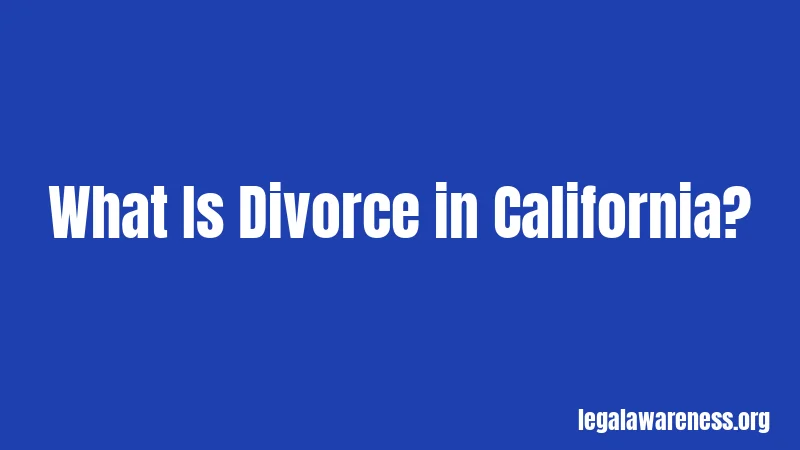Divorce Laws in California (2026): Filing Basics and Fresh Updates
Getting a divorce in California can feel overwhelming. The rules, the paperwork, the waiting. But honestly, once you understand the basics, it’s not as complicated as it seems.
California is one of the most progressive states when it comes to divorce. You don’t need to prove anyone did anything wrong. You don’t need permission from your spouse. And there are new changes in 2026 that make the process even smoother.
What Is Divorce in California?

In California, divorce is legally called “dissolution of marriage.” Pretty straightforward.
California was actually the first state to allow no-fault divorce back in 1969. That means you don’t have to blame anyone. You don’t need to prove infidelity or abuse or anything else. You just say there are “irreconcilable differences” and that’s enough.
Right?
If your spouse doesn’t want the divorce, that doesn’t matter. One person can’t force another to stay married. Period.
Basic Divorce Requirements
Residency Rules
Here’s the deal. Before you can file for divorce, you need to meet California’s residency requirements.
You or your spouse must have lived in California for at least 6 months. And you must have lived in the county where you’re filing for at least 3 months.
These rules are strict. If you don’t meet them, the court will reject your petition.
Sound complicated? It’s actually not.
Let’s say you moved to California 7 months ago and settled in Los Angeles County. You can file for divorce there. If you’ve only been in California for 4 months, you can file for legal separation now and convert it to divorce later.
The 6-Month Waiting Period
California requires a mandatory 6-month waiting period before your divorce becomes final. This starts from the day your spouse is served with divorce papers or files a response.
You can’t speed this up. Even if you and your spouse agree on everything, you still have to wait 6 months.
Think of it like a cooling-off period. The law wants to make sure you’re certain about this decision.
Filing Fees and Costs

Court Filing Fees
It costs $435 to file a petition for divorce in California. The respondent pays $435 to file a response.
So if both of you file paperwork, you’re looking at $870 in filing fees alone.
Can’t afford it? You can apply for a fee waiver. The court will review your income and expenses to see if you qualify.
Total Divorce Costs
The total cost of divorce varies wildly. Simple, uncontested divorces where you agree on everything might cost around $4,500 including lawyer fees. Contested divorces with complex assets can easily exceed $20,000.
Honestly, the more you fight, the more it costs.
If you can reach agreements outside of court, you’ll save thousands. Litigation is expensive. Cooperation is cheaper.
New 2026 Joint Petition Process
Okay… this one’s important.
Starting January 1, 2026, California allows couples to file a joint petition for divorce. This is huge.
Instead of one person filing and serving the other, you both file together. You’re both automatically “served” when you file. No process server needed. No awkward delivery of papers.
This streamlines everything. It’s faster, cheaper, and less confrontational.
Pretty straightforward.
But here’s the catch. You both need to agree on filing jointly. If your spouse won’t cooperate, you’ll need to use the traditional process.
Community Property Rules

The 50/50 Split
California is a community property state. That means everything you earned or acquired during your marriage belongs to both of you equally.
Income? Split 50/50. House bought during marriage? Split 50/50. Credit card debt? Split 50/50.
The court must divide your community property equally unless you agree otherwise in writing.
Makes sense, right?
This doesn’t mean each item gets cut in half. It means the total value gets divided equally. You might get the house while your spouse gets the retirement accounts and car.
What Is Community Property?
Community property includes:
- Wages and salaries earned during marriage
- Real estate purchased during marriage
- Cars and furniture bought during marriage
- Retirement accounts funded during marriage
- Credit card debt from the marriage
- Mortgages taken out during marriage
Basically, if you got it or owed it while married, it’s community property.
What Is Separate Property?
Separate property stays with whoever owns it. No splitting.
This includes:
- Property owned before marriage
- Gifts received by one spouse
- Inheritances received by one spouse
- Property acquired after separation
You bought a car in high school? That’s yours. Your grandmother left you money? That’s yours too.
Hold on, this part is important. If you mix separate property with community property, it can become community property. This is called “commingling.”
For example, if you deposit your inheritance into a joint bank account and use it for household expenses, you might lose your claim that it’s separate.
Spousal Support (Alimony)
How Spousal Support Works
Spousal support is money one spouse pays to the other during and after divorce. The purpose is to help the lower-earning spouse maintain a similar standard of living.
Not everyone gets spousal support. And when they do, it’s not always permanent.
Temporary vs. Permanent Support
There are two types of spousal support:
Temporary support is paid while the divorce is pending. It’s calculated using a formula based on both spouses’ incomes. This ends when the divorce is finalized.
Permanent support is ordered after the divorce is final. Despite the name, it’s not always permanent. It’s based on many factors and can last for years or decades depending on the marriage.
The 10-Year Rule
You’ve probably heard about California’s “10-year rule.” Here’s what it actually means.
If your marriage lasted less than 10 years, support usually lasts for half the length of the marriage. Married for 6 years? Support might last 3 years.
If your marriage lasted 10 years or more, the court keeps jurisdiction indefinitely. This doesn’t guarantee lifetime support. It just means the court can review and modify support later if circumstances change.
Wondering if this applies to you? The 10-year mark is measured from wedding day to separation date.
Factors the Court Considers
When deciding spousal support, the court looks at:
- Each spouse’s earning capacity and income
- The standard of living during marriage
- Length of the marriage
- Age and health of both spouses
- What each spouse contributed to the marriage
- Whether one spouse stayed home to care for children
- Time needed for the supported spouse to become self-supporting
Honestly, this is one of the most contested parts of divorce. If you’re dealing with spousal support issues, talk to a lawyer.
Tax Treatment in 2026
Important update. For divorces finalized after December 31, 2018, spousal support is no longer tax-deductible for the payer. The recipient doesn’t pay taxes on it either.
This is a federal rule. California state taxes may differ, so check with a tax professional.
Child Support and Custody
Child Support Basics
Both parents are required to financially support their children. The court calculates child support using a statewide formula that considers:
- Each parent’s income
- How much time each parent spends with the child
- Tax filing status
- Other relevant financial factors
You can’t just decide not to pay child support. It’s not optional. If you don’t pay, you face serious consequences like wage garnishment, license suspension, and even jail time.
2024-2025 Child Support Updates
California updated its child support formula in September 2024 with Senate Bill 343. The new formula better reflects shared custody arrangements and self-employment income.
Another big change came in January 2025 with Senate Bill 1055. California stopped suspending driver’s licenses for child support debtors who earn less than 70% of their county’s median income.
This change recognizes that taking away someone’s license makes it harder for them to work and pay support.
Custody Considerations
Custody has two parts: legal custody and physical custody.
Legal custody is the right to make major decisions about your child’s life. Education, healthcare, religion. These big choices.
Physical custody is where the child lives and who takes care of them day-to-day.
California courts prefer arrangements where both parents stay involved. They don’t automatically favor mothers or fathers. The focus is on what’s best for the child.
Special Divorce Options
Summary Dissolution
Married for less than 5 years? You might qualify for summary dissolution. This is a simplified divorce process.
You can use this if:
- You’ve been married less than 5 years
- You have no children together (born or adopted)
- Neither of you owns real estate
- You have limited community property and debt
- You both agree to waive spousal support
This process uses less paperwork and costs less than regular divorce. It’s basically the express lane.
Pretty cool, right?
Check California Family Code Sections 2400-2406 for the complete requirements.
Legal Separation
Don’t meet the residency requirements yet? Or maybe you don’t want to fully divorce for religious or insurance reasons?
You can file for legal separation. There’s no waiting period. You just need to live in California.
Legal separation addresses property division, support, and custody. But you stay legally married. You can’t remarry. Later, you can convert it to divorce once you meet the residency requirements.
Recent Law Changes for 2025-2026
Firearm Restrictions
California strengthened domestic violence protections. As of January 2025, courts must consider illegal firearm possession when making custody decisions.
If someone violates firearm restrictions under a domestic violence order, the court can use that against them in custody battles.
Special Needs Trust Option
New in 2025. Courts can now direct child support payments into special needs trusts for children with disabilities.
This keeps the support from counting as income for SSI eligibility. It protects crucial benefits while still providing financial support.
County Transfer Rules
Family law cases can now be transferred to any county where either party lives. This accommodates modern mobility and reduces burden on people who’ve relocated.
Remote Court Reporting Pilot
Starting July 2025, certain California counties are testing remote court reporting. This includes family law cases.
Participating counties include Los Angeles, Orange, San Diego, San Mateo, and others. This could make court proceedings more efficient and accessible.
Common Mistakes to Avoid
Don’t Hide Assets
Seriously. Don’t do this.
California requires full financial disclosure during divorce. If you hide assets, you can face serious penalties. The court can award hidden assets entirely to your spouse. You might also face contempt charges.
Don’t Rack Up Debt
During divorce proceedings, don’t build up large debts or liabilities. Any debt you take on during marriage is community debt. Your spouse is responsible for half, even if they didn’t know about it.
Want to protect yourself? Separate your finances as soon as possible.
Don’t Talk Directly About Settlement
Many people try to negotiate directly with their spouse. This usually backfires.
Emotions run high during divorce. What you say can be used against you later. Let lawyers handle the negotiations when possible.
Don’t Post on Social Media
This one’s big. Everything you post on social media can be used as evidence in your divorce.
Posting pictures at expensive restaurants while claiming you can’t afford support? Bad idea. Complaining about your spouse online? Also bad. Just stay off social media until your divorce is final.
How to File for Divorce
Step 1: Complete the Forms
You’ll need at least two forms to start:
- Petition (Form FL-100)
- Summons (Form FL-110)
If you have children, you’ll need additional forms. Each county might have local forms too.
These forms ask for basic information about your marriage and what orders you want the court to make.
Step 2: File with the Court
Take your completed forms to the court clerk. Make 2 copies first. You’ll pay the $435 filing fee unless you qualify for a fee waiver.
The clerk will stamp your documents and give you copies. Now you officially have a case number.
Step 3: Serve Your Spouse
Someone over 18 who’s not you must deliver copies to your spouse. This is called “service of process.”
Personal delivery is best. You can also use certified mail if your spouse lives out of state.
Your spouse has 30 days to respond after being served.
Step 4: Financial Disclosure
Both spouses must complete financial disclosure forms. This includes:
- Income and Expense Declaration (Form FL-150)
- Schedule of Assets and Debts (Form FL-142)
- Declaration of Disclosure (Form FL-140)
You must exchange these documents. The court needs to understand your complete financial situation.
Step 5: Reach Agreements or Go to Trial
If you agree on everything, you can submit a settlement agreement to the court. The judge reviews it and signs your divorce judgment.
Can’t agree? You’ll need temporary hearings and eventually a trial. The judge will decide property division, support, and custody for you.
Step 6: Finalize the Divorce
After the 6-month waiting period, you submit final paperwork. Once the judge signs the judgment, your divorce is final.
You’re officially divorced. You can remarry if you want.
Getting Help
Self-Help Resources
Every California court has a Family Law Facilitator or Self-Help Center. These services are free.
They can help you fill out forms and understand court procedures. They can’t give legal advice, but they’re incredibly helpful.
Hiring a Lawyer
You don’t legally need a lawyer for divorce. But if you have significant property, complicated finances, or custody disputes, hiring one is smart.
Lawyers know the law inside and out. They protect your rights and advocate for you. Yes, they cost money. But a good lawyer can save you thousands in the long run.
Consultation fees vary. Many lawyers offer free initial consultations.
Mediation
Mediation is when you and your spouse meet with a neutral third party to reach agreements. It’s cheaper than litigation and less adversarial.
Many couples find mediation helpful. You control the outcome instead of leaving everything to a judge.
What Happens After Divorce?
Modifying Orders
Life changes. Jobs change. Income changes.
You can request modifications to spousal support or child support if there’s a material change in circumstances. This includes job loss, disability, retirement, or the supported spouse getting remarried.
You’ll need to file a motion with the court and show why modification is necessary.
Enforcing Orders
If your ex doesn’t pay support, you have options:
- Wage garnishment
- License suspension
- Property liens
- Contempt of court charges
Contact the Department of Child Support Services or file a motion for enforcement.
Moving Forward
Divorce is hard. It’s emotionally draining and financially stressful. But it’s also a new beginning.
Give yourself time to heal. Seek support from friends, family, or therapists. Focus on building your new life.
You’re not alone. Millions of people get divorced every year. Most of them come out stronger on the other side.
Frequently Asked Questions
How long does a California divorce take?
At minimum, 6 months due to the mandatory waiting period. Simple uncontested divorces often finalize right around 6 months. Contested divorces with complex issues can take 1-3 years or longer.
Can I get a divorce if my spouse doesn’t agree?
Yes. California is a no-fault state. You don’t need your spouse’s permission to get divorced. They can’t stop the process by refusing to participate.
Do I need a lawyer to get divorced in California?
No, but it’s recommended if you have children, significant assets, or disputes. Self-help resources are available if you can’t afford a lawyer.
Will my spouse get half of everything I own?
Only community property is divided 50/50. Separate property (owned before marriage or inherited) stays with whoever owns it. California requires equal division of community assets and debts.
How is child custody decided in California?
Courts base custody decisions on the best interests of the child. They consider many factors including each parent’s ability to care for the child, the child’s relationship with each parent, and the child’s health and safety.
Final Thoughts
California divorce law aims to be fair and efficient. The no-fault system removes blame from the equation. The community property rules ensure equal division. Recent updates make the process smoother.
But divorce is still hard. It’s one of life’s most stressful events.
Take it one step at a time. Gather your documents. Understand your rights. Get help when you need it. Focus on moving forward.
The process might seem overwhelming now, but you’ll get through it. Most people do. And on the other side, you’ll have clarity, independence, and a fresh start.
Stay informed, stay organized, and when in doubt, talk to a lawyer.
References
- California Courts Self-Help Guide – Divorce in California: https://selfhelp.courts.ca.gov/divorce-california
- California Family Code Section 2550 (Community Property Division): https://leginfo.legislature.ca.gov/faces/codes_displaySection.xhtml?sectionNum=2550&lawCode=FAM
- California Family Code Section 4320 (Spousal Support Factors): https://leginfo.legislature.ca.gov/faces/codes_displaySection.xhtml?sectionNum=4320&lawCode=FAM
- California Courts – Property and Debts in Divorce: https://selfhelp.courts.ca.gov/divorce/property-debts
- California Lawyers Association – 2025 Legislative Updates: https://calawyers.org/family-law/2025-legislative-update-new-laws/
